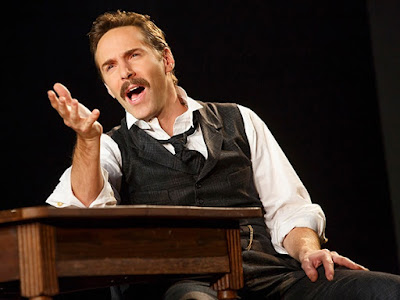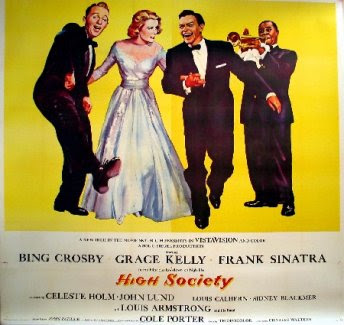Although it is my favorite Gilbert & Sullivan score, I have not seen THE PIRATES OF PENZANCE too often. I last saw it in 2001 at the Open Air Theatre, Regent's Park and, before that oddly enough, in 1985 I saw the second half (!) of a touring production which starred Paul Nicholas, Bonnie Langford and Michael Ball. Both of these productions were based on the 1980 New York production which originated at Joseph Papp's Public Theater and was a runaway success with Kevin Kline and Linda Ronstadt among others.
But on Saturday we saw the new English National Opera production at the London Coliseum which is directed by film director and G&S fan Mike Leigh in a surprisingly pleasant production. It would be silly to expect his G&S production to be as forensic in detail as his own films and plays but I think I was expecting something a little more personal in tone.

It offers it's biggest surprise in it's look: Alison Chitty has given it an eye-popping, brightly-coloured set design of various geometric shapes all seen through a large, moving round port-hole which opens up to let the chorus take their place on the expansive Coliseum stage.
The other most obvious Leigh-ism I could spot was the the character of Ruth, the nursery maid of hero Frederic who was the cause of him being apprenticed to a band of pirates. I had to double-check my programme to see who was playing the role as Rebecca de Pont Davies looks very much like Ruth Sheen, the delightfully-gawky actress who played major roles in LIFE IS SWEET and ANOTHER YEAR. I guess it was another Leigh-ism to have Ruth be the only one who does not join in the exuberant finale but sits dejected and alone on a grave, forgotten about while the Pirates and the Major-General's daughters all pair up.
Otherwise it felt like a very traditional production with little bits of comedy business given to The Pirate King and The Major-General. I suppose if I had seen other previous traditional productions I might have spotted more additions.
What took me most by surprise was the vocal weakness of the women. Luckily there was surtitles displaying the lyrics otherwise I would not have been aware what de Pont Davies or Claudia Boyle as Mabel were singing. The men all had stronger voices, in particular I enjoyed the barnstorming Joshua Bloom as The Pirate King and Andrew Shore had a ball as the conniving Major-General. Alexander Robin Baker was also a strong vocal presence as Samuel, the Pirate King's lieutenant.
By and large, I felt all the ENO voices were not on a par with the 1980 Public Theater cast recording - I guess an opera singer will always sing the note rather than putting any character into it, it all sounded a bit colourless to my ears. There was a peculiarly sombre version of "A Policeman's Lot Is Not A Happy One" which just came over as rather drab by Jonathan Lemalu as the Police Sergeant.
Frederic was well sung by Robert Murray but his tubbyness made it hard to believe that Mabel and her sisters would all swoon while singing "how rare his beauty"!
It was odd that I noticed in this production how much Gilbert's story is so taken with things not being as they seem: Ruth leads Frederic to believe she is beautiful until he sees the fair Mabel, the Major-General weeps over the tombs of his ancestors but it turns out he bought the chapel a year before so they are not actually his relatives, Frederic may think he is 21 but as he was born in a leap year he is only 9 if his age is judged by birthdays and finally the Pirates are revealed to all be peers of the realm who have 'gone wrong' so are forgiven everything.
On the whole I liked the production and it was a fun way to spend an evening, I just wish it had felt a bit more idiosyncratic in performance rather than in it's design.















































